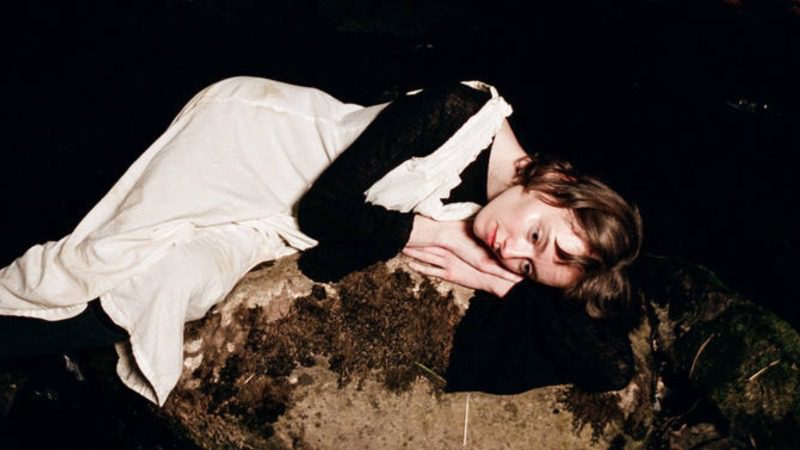Skullcrusher, the project of West Coast songstress Helen Ballentine, established herself as a mainstay of the atmospheric folk scene with 2022’s Quiet the Room, a sticky, spooky collection of textural acoustic tracks anchored by Ballentine’s haunted falsetto. On And Your Song is Like a Circle, the enigmatic artist’s sophomore project and first album under Dirty Hit, Ballentine reaffirms her position as a spinner of gauzy, introspective alt-folk. She also dips a toe into moody electronica, encircling her defining, ghostly meditations in synthesizers and distorted, soaring vocals.
And Your Song is Like a Circle was inspired by, and written throughout, a cross-country move whose destabilizing force knocked Ballentine off-kilter and expanded her songwriting scope from the familiar discord of the domestic to frightening, inevitable scenes of spatiotemporal change. The album’s opening lyric, “What do I live for?” floats forth atop sparse, lugubrious piano and orchestral vocal harmonies, a hint at the confusion that will undergird most of its imagery. Ballentine’s searching, exploratory lyrics have always been a strength, and her new project is no exception. On “Living,” a sweet, searching bildungsroman of a track, she sings, “You are going through the motions / Of the evening / In your body you are living / In the passing of an hour.” The lyric’s minimalism is bolstered by a sparkling, swelling wave of acoustic strings; as the song opens and softens, it nurses the cotidian into something worth examining—that is, into a life.
Ballentine has an instinctive feel for sparseness, a tool she uses with abandon and to great emotional effect. On the album’s opener “March,” an operatic, piano-heavy base is whittled down to its barest parts, waves crashing and strings held until they’re whispers of themselves. On “Periphery,” one of the album’s lusher moments, a repeating acoustic chord progression and a gently ambient soundscape make up the bulk of the instrumentation—it is Ballentine’s ghostly self-harmonizing that fills the sonic space.
Much of her sophomore album feels like a hitch in one’s breath, the moment before a great, rumbling musical opening that rarely occurs. All the more satisfying, then, when it does: on “Exhale” and “Vessel” (the album’s antepenultimate and penultimate songs, respectively), the album celebrates a triumphant volta. As Ballentine accepts the metamorphosis she is undergoing, the album‘s instrumentals become less timid, flowering into atmospheric synths and flowing, hymnal harmonies. “I feel it leave / I feel it in me / Endlessly / It surrounds me,” Ballentine breathes as “Exhale” draws to a close; “I wanna live for someone / Wanna carry their life / But I need to carry mine,” she realizes as “Vessel,” a gorgeous amalgamation of minor chord-picks and defiant, upward-soaring arpeggios, peaks. The album, rather than continuing to hold Ballentine in the past, transfigures into a tool by which she might come to terms with her present and look toward the unknown.
This sense of expectation can, occasionally, be underwhelming: “Changes,” the album’s longest and sparsest arrangement, leaves the listener with a sense of missed opportunity and brings the album to a pace so slow as to become almost grating. At other times, it feels one-note and a tad repetitive: one would be hard-pressed to differentiate between many of its songs, even after multiple listens.
Ballentine has been compared to Julie Byrne, and rightfully so: she uses a saccharine voice to deal with the same cavernous, biomimetic internal conflicts. So, too, to Gillian Welch: astute folk aficionados will notice an homage to the latter in “Red Car,” when Ballentine sings, “I dream of a highway back to you” — a nod to Welch’s seminal fourteen-minute searer. Where Skullcrusher finds her own is in her dealings with electronica. On And Your Song is Like a Circle, Ballentine uses synths and distortions of her own vocals to create an homage to the void in which she finds herself. On “Dragon,” a shoegazey contemplation on the weight of living, a simple piano refrain is buoyed forth by 808 drums and buzzy eighties synths.
As the album draws to a close with “The Empyting,” Ballentine arches backward to the place she began the album. “Like her, I am emptying,” she coos, “What surrounds us leads beyond the scene / Because the burden lives within us all.” A skeletal guitar and crackling ambient noises cradle her voice, which stretches achingly forward as the album ascends into a mellifluous ending. And Your Song is Like a Circle ends with an acceptance of the present, a cautious, injured hope for the future, and an embrace of the more inexorable of life’s disappointments. It is vaporous and intimate, gauzy and blurred—a triumph in Skullcrusher’s thematic and instrumental evolution.
Miranda Wollen is a former Paste Music intern. She lives in New York and attends school in Connecticut, but you can find her online @mirandakwollen.




